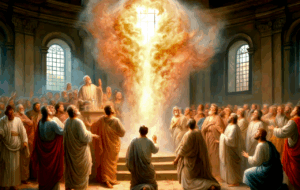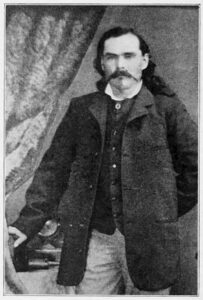
Over the last half-century, my perspective on Christianity has remarkably evolved. My upbringing was within the American religious culture known as “old-time Pentecost,” a loosely affiliated denomination encompassing the fundamental belief structure of Pentecostalism as it was understood from the 1940s to the 1980s.
Learning is an ongoing process that leads us from limited knowledge to greater understanding. As we gain knowledge, it shapes our thoughts and perspectives, carrying responsibility and impact with it. In Christianity, this transformative journey is known as “discipleship,” where we deepen our understanding of God and His teachings, fostering a growing relationship with Him.
RELIGIOUS ORGANIZATIONS
Within human society, we find various Christian religious organizations, often categorized as either Protestant or Catholic. Among Protestant groups, many organizations are identified based on historical events or specific religious traditions they align with. These organizations and the customary practices associated with them are often referred to as “religious” behavior.
The concept of human religious organizations or “religion” emerged due to human attempts to structure belief systems, often stemming from divisions or schisms within existing systems. Along this path, different individuals held divergent opinions on how to proceed, leading to a split between those advocating for change and those adhering firmly to tradition.
I am very thankful to God for my upbringing and what I was taught. I was brought up to walk with God and follow his word. However, Pentecostalism has its elements of human organization, and within that general denomination of religious worship was a form of legalism and religiosity resembling all other religions.
As I continue my personal study and the years go by, I find that I am distancing myself from what is commonly known as the “organized church.” Let me clarify that when I mention the term “organized church,” I am not implying that there should be no structure within the body of Christ. In fact, the Bible provides clear guidance on the framework that God has established for us to follow, and straying from it leads us away from His intended design. Yet, I have become firmly convinced that the structure He ordained bears little resemblance to the prevailing form of organized Christian religion we see today.

PERSONAL CHRISTIANITY
To truly understand how to live as a Christian, it is vital to understand the teachings of Jesus. Equally important is gaining insights from the apostles’ teachings, which guide our faith journey within the community of believers. This framework encompasses our everyday lives, emphasizing close relationships, unity, and the transformative power of the Holy Spirit. It is about actively applying these principles to impact the world around us.
In contrast, modern organized Christian religion tends to emphasize Sunday gatherings and the support of corresponding infrastructures, both financially and with voluntary labor. It stresses the rituals and traditional activities confined to those specific times rather than the intimate connections we share throughout life, the workings of the Holy Spirit, and our mission to impact the world. In some cases, the emphasis is on what God can do for you rather than what you can do for God and his Kingdom.
The essential elements of being a Christian include overall group organization and intimate personal relationship with God.
First and foremost, it is important to understand that no one can make a personal agreement or negotiation with God that goes beyond what is revealed in the Bible. Our regeneration, the process of being spiritually reborn, occurs through the redeeming sacrifice of Jesus Christ, which provides forgiveness for our sins. There is no alternative path or separate gate for different individuals. Jesus is the gatekeeper for all of us, as taught in Christian doctrine based on God’s word. This fundamental truth applies universally to all Christians, without exception.
However, alongside this universal truth, I firmly believe that we must cultivate a personal relationship with God through Jesus. This relationship evolves as we are mentored by fellow believers and engage in interactions with God through the work of the Holy Spirit. It is a dynamic process that involves the church’s collective structure, its leadership, and organizational aspects, as well as a deeply personal and intimate connection between myself and God. I am interconnected with other believers, yet I also have individual moments of communion with the Father, experiencing a sense of solitude within my thoughts

WE ARE A BODY
Paul used a powerful analogy when writing to the Corinthians about spiritual gifts. Just as each part of our body functions individually, with the arm responding to signals from the brain and the leg, toe, and eyeball, each carrying out their specific roles, we are ALSO meant to operate as a unified whole. God designed a system where every individual, whether a leader or a follower, has a vital role to play. Within this system are teachers, helpers, organizers, leaders, servers, and countless others, each contributing actively to the functioning of the whole, both as a group and individually on a day-to-day basis, both in private and public affairs.
Organized religion bears little resemblance to what we see in scripture. This is not to say that organized religion is wrong; any more than any other human structure is “wrong.” We do not see associations, foundations, corporations, and the like as being “wrong” when they create a structure to fulfill a purpose. They function as designed and achieve the goals they have set out using the human structure they have developed.
WE WORSHIP IN SPIRIT
However, our vibrant relationship with God extends far beyond the confines of physical structures. It encompasses every aspect of our existence through the transformative work of the Holy Spirit. Jesus himself emphasized this when he spoke to the Samaritan woman at the well, proclaiming that worship would no longer be limited to a specific location such as a mountain or Jerusalem. Instead, true worship would be characterized by a connection with God in “Spirit and in truth.” Jesus’ words are clear and profound.
Jesus fulfilled the need for temple worship through his sacrificial death on the cross. He declared, “It is finished,” signifying the completion of his work. The ultimate sacrifice was made, and through the Son, we gained access to the Father. If we worship God, we do so in “spirit.” Here, the term “spirit” evokes a sense of something resembling the invisible yet powerful nature of the wind. We can feel and witness its effects on the material world, yet its essence remains intangible, originating from an unknown source and returning to the same.
WE WORSHIP IN TRUTH
Jesus also emphasized the importance of worshiping Him in truth. Our worship should be authentic and sincere, free from external displays, empty rituals, and superficial acts that merely pretend to honor God. In the days of the temple, people were not required to honor God from their hearts genuinely; as long as they followed the prescribed activities and adhered to the regulations, they were considered compliant. However, God did not desire this shallow form of worship, and with the work of Jesus, that entire paradigm came to an end. The era of temple worship concluded with Jesus’ death.
Now, our worship of Him must be genuine and truthful. When we engage in worship, it should spring from the depths of our hearts, transcending mere rituals, religious practices, and traditions. We no longer rely on priests or the confines of a physical temple, liturgy, or customary religious practices. Instead, we are called to personally connect with Him, worshiping Him in the context of His presence, which is found in the realm of the Spirit.

WORSHIP = HEART MOTIVATED ACTIONS OF DAILY LIFE
In the opening chapter of his letter, James profoundly conveys that if we consider ourselves “religious” (someone who claims to hold deep reverence and honor for God) yet fail to control our words, we are merely deceiving ourselves. He imparts to his readers the essence of “true religion” or authentic religious worship, which lies in extending assistance to those who cannot help themselves. Why is this significant? Because it embodies the presence of God, the very heart of God, flowing like that wind, originating from God, and reaching out to those in need. In doing so, we fulfill God’s will, and our actions become the natural outcome, the genuine result of our relationship with Him, bearing fruit that embodies truthfulness and reveals Him to the world.
When I express that I am not deeply religious but rather a dedicated Christian, it often elicits confusion from many. The rationale behind this statement is rooted in my growth and evolving understanding of the worship God truly desires from the biblical example. I have come to realize, in a real and personal way, that following God and His word, engaging in a dynamic interaction with Him, and living a life directed by His guidance has little to do with what takes place on a Sunday morning as millions of spectator sit in buildings across the world. It revolves more around the intimate gathering of believers, whether there are two, five, or twenty of them, as they engage with one another and the Holy Spirit. It encompasses their mutual growth through mentorship, with older men guiding the younger men and older women imparting wisdom to the younger women. It is intricately connected to the Holy Spirit’s active work within the body of believers from Monday to Saturday, rather than being centered on the brief congregation that assembles on Sundays for a mere hour.
Lastly, our worship, characterized by being in “spirit and truth,” is deeply intertwined with obedience and relationship. Through our obedience to God and living as His children, we express that He is deserving of our utmost honor. It transcends the realm of mere rituals; rather, it encompasses the entirety of our lifestyle. In English, the term “worship” originates from the concept of worthiness. When we truly engage in worship, we acknowledge God’s worthiness in our obedience. We recognize His worthiness of our honor and praise, affirming that He deserves our unwavering devotion and trust. Worship has little to do with music, songs, or Sunday morning gatherings. It is intricately woven into the fabric of our faith in God and how that faith permeates every aspect of our daily lives.
CONCLUSION
Once more, I feel compelled to make my point abundantly clear. This is not a diatribe aimed at diminishing the importance of Sunday morning church attendance. If you find a local congregation that faithfully imparts God’s word, prioritizes prayer, and nurtures a genuine connection with God, then be a part of that ministry by all means. It is no more amiss than a doctor attending a medical convention or a teacher engaging in an educator’s conference.
However, do not allow that Sunday meeting to become the focal point of your spiritual journey with God. While you can undoubtedly learn, grow, and be strengthened through insightful teachings, it is vital to recognize that gathering the body of Christ is far from a passive spectator.
Through this collective nurturing, we can go out into the world, pouring out the wonderful message and immeasurable gift of eternal life bestowed upon us through Jesus Christ, our Lord.






